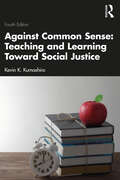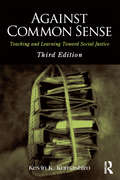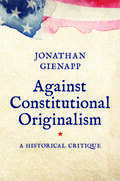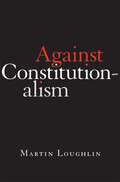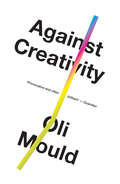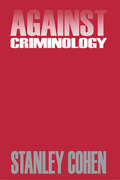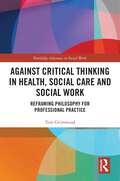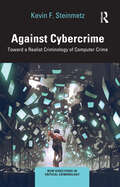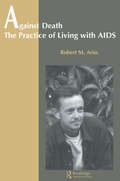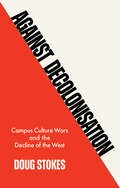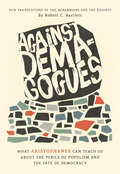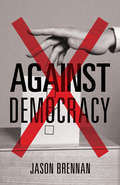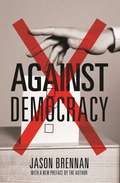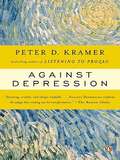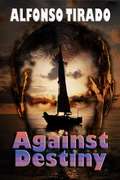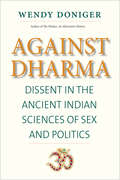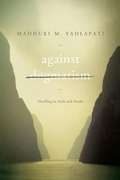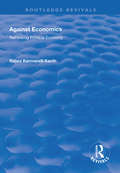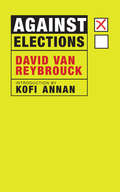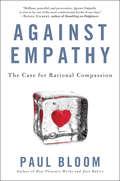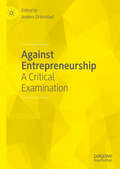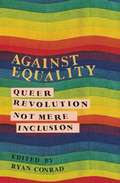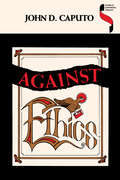- Table View
- List View
Against Common Sense: Teaching And Learning Toward Social Justice
by Kevin K. KumashiroWhat does it mean to teach for social justice? Drawing on his own classroom experiences, leading author and educator Kevin K. Kumashiro examines various aspects of anti-oppressive teaching and learning and their implications for six different subject areas and various grade levels. Celebrating 20 years as a go-to resource for K-12 teachers and teacher educators, this 4th edition of the bestselling Against Common Sense: Teaching and Learning Toward Social Justice features:• An expanded introduction that examines teaching in today’s context of censorship and attacks on diversity, democracy, and teaching truth;• New sections on teacher preparation, social studies, reading and writing, and the arts;• Updated lists of resources in every chapter;• Graphics, teacher responses, and discussion questions to enhance comprehension and help translate theory into practice across the disciplines.Compelling and accessible, the 4th edition of Against Common Sense continues to offer readers the tools they need to begin teaching against their commonsensical assumptions and toward democracy and justice.
Against Common Sense: Teaching and Learning Toward Social Justice
by Kevin K. KumashiroThe phrase "teaching for social justice" is often used, but not always explained. What does it look like to teach for social justice? What are the implications for anti-oppressive teaching across different areas of the curriculum? Drawing on his own experiences teaching diverse grades and subjects, leading author and educator Kevin Kumashiro examines various aspects of anti-oppressive teaching and learning in six different subject areas. Celebrating 10 years as a go-to resource for K-12 teachers and teacher educators, this third edition of the bestselling Against Common Sense features: • A new introduction that addresses the increased challenges of anti-oppressive teaching in an era of teacher evaluations, standardization and ever-increasing accountability. • End of chapter teacher responses that provide subject-specific examples of what anti-oppressive teaching really looks like in the classroom.• End of chapter questions for reflection that will enhance comprehension and help readers translate abstract ideas into classroom practice. • Additional readings and resources to inspire students to further their social justice education. Compelling and accessible, Against Common Sense continues to offer readers the tools they need to begin teaching against their common sense assumptions and toward social justice.
Against Constitutional Originalism: A Historical Critique (Yale Law Library Series in Legal History and Reference)
by Jonathan GienappA detailed and compelling examination of how the legal theory of originalism ignores and distorts the very constitutional history from which it derives interpretive authority Constitutional originalism stakes law to history. The theory’s core tenet—that the U.S. Constitution should be interpreted according to its original meaning—has us decide questions of modern constitutional law by consulting the distant constitutional past. Yet originalist engagement with history is often deeply problematic. And now that a majority of justices on the U.S. Supreme Court champion originalism, the task of scrutinizing originalists’ use and abuse of history has never been more urgent. In this comprehensive and novel critique of originalism, Jonathan Gienapp targets originalists’ unspoken assumptions about the Constitution and its history. Originalists are committed to recovering the Constitution laid down at the American Founding, yet they often assume that the Constitution is fundamentally modern. Rather than recovering the original Constitution, they project their own understandings onto it, assuming that eighteenth-century constitutional thinking was no different than their own. They take for granted what it meant to write a constitution down, what law was, how it worked, and where it came from, and how a constitution’s meaning was fixed. In the process, they erase the Constitution that eighteenth-century Americans in fact created. By understanding how originalism fails, we can better understand the Constitution that we have.
Against Constitutionalism
by Martin LoughlinA critical analysis of the transformation of constitutionalism from an increasingly irrelevant theory of limited government into the most influential philosophy of governance in the world today. Constitutionalism is universally commended because it has never been precisely defined. Martin Loughlin argues that it is not some vague amalgam of liberal aspirations but a specific and deeply contentious governing philosophy. An Enlightenment idea that in the nineteenth century became America’s unique contribution to the philosophy of government, constitutionalism was by the mid-twentieth century widely regarded as an anachronism. Advocating separated powers and limited government, it was singularly unsuited to the political challenges of the times. But constitutionalism has since undergone a remarkable transformation, giving the Constitution an unprecedented role in society. Once treated as a practical instrument to regulate government, the Constitution has been raised to the status of civil religion, a symbolic representation of collective unity. Against Constitutionalism explains why this has happened and its far-reaching consequences. Spearheaded by a “rights revolution” that subjects governmental action to comprehensive review through abstract principles, judges acquire greatly enhanced power as oracles of the regime’s “invisible constitution.” Constitutionalism is refashioned as a theory maintaining that governmental authority rests not on collective will but on adherence to abstract standards of “public reason.” And across the world the variable practices of constitutional government have been reshaped by its precepts. Constitutionalism, Loughlin argues, now propagates the widespread belief that social progress is advanced not through politics, electoral majorities, and legislative action, but through innovative judicial interpretation. The rise of constitutionalism, commonly conflated with constitutional democracy, actually contributes to its degradation.
Against Creativity
by Oli MouldEverything you have been told about creativity is wrong.From line managers, corporate CEOs, urban designers, teachers, politicians, mayors, advertisers and even our friends and family, the message is 'be creative'. Creativity is heralded as the driving force of our contemporary society; celebrated as agile, progressive and liberating. It is the spring of the knowledge economy and shapes the cities we inhabit. It even defines our politics. What could possibly be wrong with this?In this brilliant, counter intuitive blast Oli Mould demands that we rethink the story we are being sold. Behind the novelty, he shows that creativity is a barely hidden form of neoliberal appropriation. It is a regime that prioritizes individual success over collective flourishing. It refuses to recognise anything - job, place, person - that is not profitable. And it impacts on everything around us: the places where we work, the way we are managed, how we spend our leisure time. Is there an alternative? Mould offers a radical redefinition of creativity, one embedded in the idea of collective flourishing, outside the tyranny of profit. Bold, passionate and refreshing, Against Creativity, is a timely correction to the doctrine of our times.
Against Criminology
by Stanley CohenDuring the 1960s, traditional thinking about crime and its punishment, deviance and its control, came under radical attack. The discipline of criminology split into feuding factions, and various schools of thought emerged, each with quite different ideas about the nature of the crime problem and its solutions. These differences often took political form, with conservative, liberal, and radical supporters, and the resulting controversies continue to reverberate throughout the fields of criminology and sociology, as well as related areas such as social work, social policy, psychiatry, and law. Stanley Cohen has been at the center of these debates in Britain and the United States. This volume is a selection of his essays, written over the past fifteen years, which contribute to and comment upon the major theoretical conflicts in criminology during this period. Though associated with the "new" or radical criminology, Cohen has always been the first to point out its limitations particularly in translating its theoretical claims into real world applications. His essays cove a wide range of topics-political crime, the nature of individual responsibility, the implications of new theories for social work practice, models of crime used in the Third World, banditry and rebellion, and the decentralization of social control. Also included is a previously unpublished paper on how radical social movements such as feminism deal with criminal law. Many criminology textbooks present particular theories or research findings. This book uniquely reviews the main debates of the last two decades about just what the role and scope of the subject should be.
Against Critical Thinking in Health, Social Care and Social Work: Reframing Philosophy for Professional Practice (Routledge Advances in Social Work)
by Tom GrimwoodThis book stages a provocative dialogue between social work, health and social care and contemporary philosophy in order to inform theory and practice in a complex and challenging world. Today, the social world is marked by deep-rooted complexities, tensions and challenges. Health workers and social workers are constantly reminded to employ critical thinking to navigate this world through their practice. But given how many of these challenges pose significant problems for the theories that these subjects have traditionally drawn upon, should we now be critical of critical thinking – its assumptions, its basis, and its aspirations – itself? Arguing that health and social work theory must reconsider its deep-rooted assumptions about criticality in order to navigate complex neoliberalism, post-truth, and the relationship between language and late capitalism, it examines how the fusion of theory and practice can re-imagine critical thinking for health and social work in social work. It will be of interest to all scholars, students and professionals of social work and health and social care.
Against Cybercrime: Toward a Realist Criminology of Computer Crime (New Directions in Critical Criminology)
by Kevin F. SteinmetzThis book advances a theoretically informed realist criminology of computer crime. Looking beyond current strategies of online crime control, this book argues for a new sort of policy that addresses the root causes of computer crime and criminality, reduces the harms experienced by the victims of such crimes, and does not unduly contribute to state and corporate power and surveillance. Drawing both on the proponents of realist criminology and on those who have leveled critiques of the approach, Steinmetz illustrates the contours of a realist criminology of computer crime by considering definitions of harm with online crime, the idiosyncrasies of online locality and community, the social relations of computer crime, the tension between piecemeal reform and structural changes, and other matters. Furthermore, Steinmetz surveys the methodological dimensions of computer crime research, offers a critique of positivist “computational criminology,” and posits an agenda for computer crime policy. Against Cybercrime is an essential reading for all those engaged with cybercrime, realist criminology, criminological theory, and social harm online.
Against Death: The Practice of Living With Aids
by Robert ArissRobert Ariss - activist and academic - had a unique vision of HIV/AIDS. As an HIV seropositive individual for many years before his death on May 9, 1994, he was a full participant in, and critic of, the development of the gay community's response to the HIV epidemic both in Australia and internationally. Though Ariss' life is a definite presence in this study, Against Death: The Practice of Living with AIDS is not an autobiography. Instead, it is a unique and critical account of a public health crisis, a community's response, and the politics of sexuality. It was in Sydney, Australia, world-famous for its Gay and Lesbian Mardi Gras, that Robert Ariss lived and worked. It is his vision of that community - of its members infected with and affected by HIV - which is documented in this remarkable anthropological study. Yet the study's implications reach beyond Sydney to all communities living with HIV and AIDS.
Against Decolonisation: Campus Culture Wars and the Decline of the West
by Doug StokesFollowing the killing of George Floyd in 2020, a moral panic gripped the US and UK. To atone for an alleged history of racism, statues were torn down and symbols of national identity attacked. Across universities, fringe theories became the new orthodoxy, with a cadre of activists backed by university technocrats adopting a binary worldview of moral certainty, sin and deconstructive redemption through Western self-erasure. This hard-hitting book surveys these developments for the first time. It unpacks and challenges the theories and arguments deployed by ‘decolonisers’ in a university system now characterised by garbled leadership and illiberal groupthink. The desire to question the West’s sense of itself, deconstruct its narratives and overthrow its institutional order is an impulse that, ironically, was underpinned by a more confident and assured Western hegemony, which is now waning and under great strain. If its light continues to dim, who or what will carry the torch for human freedom and progress?
Against Demagogues: What Aristophanes Can Teach Us about the Perils of Populism and the Fate of Democracy, New Translations of the Acharnians and the Knights
by Prof. Robert C. BartlettTimeless comedies on resisting tyranny from one of history’s greatest comic playwrights. Against Demagogues presents Robert C. Bartlett's new translations of Aristophanes' most overtly political works, the Acharnians and the Knights. In these fantastically inventive, raucous, and raunchy comedies, the powerful politician Cleon proves to be democracy's greatest opponent. With unrivalled power, both plays make clear the dangers to which democracies are prone, especially the threats posed by external warfare, internal division, and class polarization. Combating the seductive allure of demagogues and the damage they cause, Against Demagogues disentangles Aristophanes' serious teachings from his many jokes and pratfalls, substantiating for modern readers his famous claim to "teach justice" while "making a comedy" of the city. The book features an interpretive essay for each play, expertly guiding readers through the most important plot points, explaining the significance of various characters, and shedding light on the meaning of the plays' often madcap episodes. Along with a contextualizing introduction, Bartlett offers extensive notes explaining the many political, literary, and religious references and allusions. Aristophanes' comedic skewering of the demagogue and his ruthless ambition—and of a community so ill-informed about the doings of its own government, so ready to believe in empty promises and idle flattery—cannot but resonate strongly with readers today around the world.
Against Democracy
by Jason BrennanMost people believe democracy is a uniquely just form of government. They believe people have the right to an equal share of political power. And they believe that political participation is good for us--it empowers us, helps us get what we want, and tends to make us smarter, more virtuous, and more caring for one another. These are some of our most cherished ideas about democracy. But, Jason Brennan says, they are all wrong.In this trenchant book, Brennan argues that democracy should be judged by its results--and the results are not good enough. Just as defendants have a right to a fair trial, citizens have a right to competent government. But democracy is the rule of the ignorant and the irrational, and it all too often falls short. Furthermore, no one has a fundamental right to any share of political power, and exercising political power does most of us little good. On the contrary, a wide range of social science research shows that political participation and democratic deliberation actually tend to make people worse--more irrational, biased, and mean. Given this grim picture, Brennan argues that a new system of government--epistocracy, the rule of the knowledgeable--may be better than democracy, and that it's time to experiment and find out.A challenging critique of democracy and the first sustained defense of the rule of the knowledgeable, Against Democracy is essential reading for scholars and students of politics across the disciplines.
Against Democracy: New Preface
by Jason BrennanMost people believe democracy is a uniquely just form of government. They believe people have the right to an equal share of political power. And they believe that political participation is good for us—it empowers us, helps us get what we want, and tends to make us smarter, more virtuous, and more caring for one another. These are some of our most cherished ideas about democracy. But Jason Brennan says they are all wrong.In this trenchant book, Brennan argues that democracy should be judged by its results—and the results are not good enough. Just as defendants have a right to a fair trial, citizens have a right to competent government. But democracy is the rule of the ignorant and the irrational, and it all too often falls short. Furthermore, no one has a fundamental right to any share of political power, and exercising political power does most of us little good. On the contrary, a wide range of social science research shows that political participation and democratic deliberation actually tend to make people worse—more irrational, biased, and mean. Given this grim picture, Brennan argues that a new system of government—epistocracy, the rule of the knowledgeable—may be better than democracy, and that it's time to experiment and find out.A challenging critique of democracy and the first sustained defense of the rule of the knowledgeable, Against Democracy is essential reading for scholars and students of politics across the disciplines. Featuring a new preface that situates the book within the current political climate and discusses other alternatives beyond epistocracy, Against Democracy is a challenging critique of democracy and the first sustained defense of the rule of the knowledgeable.
Against Depression
by Peter D. KramerIn his landmark bestseller Listening to Prozac, Peter Kramer revolutionized the way we think about antidepressants and the culture in which they are so widely used. Now Kramer offers a frank and unflinching look at the condition those medications treat: depression. Definitively refuting our notions of "heroic melancholy," he walks readers through groundbreaking new research—studies that confirm depression's status as a devastating disease and suggest pathways toward resilience. Thought-provoking and enlightening, Against Depression provides a bold revision of our understanding of mood disorder and promises hope to the millions who suffer from it. .
Against Destiny: Life does not end with death.
by Alfonso TiradoAntonio Carrales, coming back after having visited Doña Leonor, his mother (in the novel La Dama del Silencio, from the same author), in Mexico City, with a deep pain in his soul by the sad omen that he will never see her again, returns to his life in New York City. The story tells part of the life of Antonio, historical researcher, navigator of dreams and a passionate writer, and in parallel, it’s the story of the adventures of an ambitious Spaniard, traveling to San Francisco, attracted by the discovery of the gold deposits in the 1850's. The route to get to San Francisco on the Atlantic side was crossing through Nicaragua. As soon as he disembarks, Diego Ruelas, amazed by the tropical exuberance, changes his plans, stays in Nicaragua and in a short time falls in love, head over heels with a beautiful native girl. They live in the years of tyranny by the freebooter William Walker. His wife and their son disappear when the slave hunt is unleashed. Diego Ruelas, after a tireless search for his family, gives up and totally beaten decides to return to Spain. During the voyage back, the ship is struck by a storm and he dies. Antonio Carrales sinks into the abyss of disappointed love and decides to take a long trip on his sail boat. He is caught by a storm and the ship is destroyed. When he wakes up he doesn’t remember anything about where or who he is. They rescue him, but because of his attitude towards the Coast Guard, they wonder if he has suffered any brain damage that causes him amnesia, and it gets worse, when they discover that he pretends to be someone else, someone who doesn’t correspond to the papers that identify him as Antonio Carrales and he insists on calling himself Diego Ruelas. The case is assigned by the hospital to a doctor in psychology. Things get even more complicated when she falls in love with her patient during the process of clarifying his identity. They manage, with the intervention of a hypnotist and researcher
Against Dharma: Dissent in the Ancient Indian Sciences of Sex and Politics (The Terry Lectures Series)
by Wendy DonigerAn esteemed scholar of Hinduism presents a groundbreaking interpretation of ancient Indian texts and their historic influence on subversive resistance Ancient Hindu texts speak of the three aims of human life: dharma,artha, and kama. Translated, these might be called religion, politics, and pleasure, and each is held to be an essential requirement of a full life. Balance among the three is a goal not always met, however, and dharma has historically taken precedence over the other two qualities in Hindu life. Here, historian of religions Wendy Doniger offers a spirited and close reading of ancient Indian writings, unpacking a long but unrecognized history of opposition against dharma. Doniger argues that scientific disciplines (shastras) have offered lively and continuous criticism of dharma, or religion, over many centuries. She chronicles the tradition of veiled subversion, uncovers connections to key moments of resistance and voices of dissent throughout Indian history, and offers insights into the Indian theocracy’s subversion of science by religion today.
Against Dogmatism: Dwelling in Faith and Doubt
by Madhuri M. YadlapatiMany contemporary discussions of religion take an absolute, intractable approach to belief and non-belief, which privileges faith and dogmatism while treating doubt as a threat to religious values. As Madhuri M. Yadlapati demonstrates, however, there is another way: a faith (or non-faith) that embraces doubt and its potential for exploring both the depths and heights of spiritual reflection and speculation. Through three distinct discussions of faith, doubt, and hope, Yadlapati explores what it means to live creatively and responsibly in the everyday world as limited, imaginative, and questioning creatures. She begins with a perceptive survey of diverse faith experiences in Islam, Buddhism, Judaism, Hinduism, and Protestant Christianity, then narrows her focus to Protestant Christianity and Hinduism to explore how the great thinkers of those faiths have embraced doubt in the service of spiritual transcendence. Defending the rich tapestry of faith and doubt against polarization, Against Dogmatism reveals a spiritual middle way, an approach native to the long-standing traditions in which faith and doubt are interwoven in constructive and dynamic ways.
Against Ecological Sovereignty: Ethics, Biopolitics, and Saving the Natural World (Posthumanities)
by Mick SmithAgainst Ecological Sovereignty is a passionate defense of radical ecology that speaks directly to current debates concerning the nature, and dangers, of sovereign power. Engaging the work of Bataille, Arendt, Levinas, Nancy, and Agamben, among others, Mick Smith reconnects the political critique of sovereign power with ecological considerations, arguing that ethical and political responsibilities for the consequences of our actions do not end with those defined as human.Against Ecological Sovereignty is the first book to turn Agamben&’s analysis of sovereignty and biopolitics toward an investigation of ecological concerns. In doing so it exposes limits to that thought, maintaining that the increasingly widespread biopolitical management of human populations has an unrecognized ecological analogue—reducing nature to a &“resource&” for human projects. Smith contends that a radical ecological politics must resist both the depoliticizing exercise of sovereign power and the pervasive spread of biopolitics in order to reveal new possibilities for creating healthy human and nonhuman communities.Presenting a stinging critique of human claims to sovereignty over the natural world, Smith proposes an alternative way to conceive of posthumanist ecological communities—one that recognizes the utter singularity of the beings in them.
Against Economics: Rethinking Political Economy (Routledge Revivals)
by Rajani Kannepalli KanthPublished in 1997, this postmodern critique provides a discourse on internal dynamics of the economics world view, suggesting for future societal wellbeing that we simply do not criticize economics but dispense it altogether. It argues that in the modern era economics have become obsolete as we live in a society riddled with corruption.
Against Elections: The Case For Democracy
by Kofi Annan David Van ReybrouckA small book with great weight and urgency to it, this is both a history of democracy and a clarion call for change."Without drastic adjustment, this system cannot last much longer," writes Van Reybrouck, regarded today as one of Europe's most astute thinkers. "If you look at the decline in voter turnout and party membership, and at the way politicians are held in contempt, if you look at how difficult it is to form governments, how little they can do and how harshly they are punished for it, if you look at how quickly populism, technocracy and anti-parliamentarianism are rising, if you look at how more and more citizens are longing for participation and how quickly that desire can tip over into frustration, then you realize we are up to our necks." Not so very long ago, the great battles of democracy were fought for the right to vote. Now, Van Reybrouck writes, "it's all about the right to speak, but in essence it's the same battle, the battle for political emancipation and for democratic participation. We must decolonize democracy. We must democratize democracy." As history, Van Reybrouck makes the compelling argument that modern democracy was designed as much to preserve the rights of the powerful and keep the masses in line, as to give the populace a voice. As change-agent, Against Elections makes the argument that there are forms of government, what he terms sortitive or deliberative democracy, that are beginning to be practiced around the world, and can be the remedy we seek. In Iceland, for example, deliberative democracy was used to write the new constitution. A group of people were chosen by lot, educated in the subject at hand, and then were able to decide what was best, arguably, far better than politicians would have. A fascinating, and workable idea has led to a timely book to remind us that our system of government is a flexible instrument, one that the people have the power to change.
Against Empathy: The Case for Rational Compassion
by Paul BloomWe often think of our capacity to experience the suffering of others as the ultimate source of goodness. Many of our wisest policy-makers, activists, scientists, and philosophers agree that the only problem with empathy is that we don't have enough of it.Nothing could be farther from the truth, argues Yale researcher Paul Bloom. In AGAINST EMPATHY, Bloom reveals empathy to be one of the leading motivators of inequality and immorality in society. Far from helping us to improve the lives of others, empathy is a capricious and irrational emotion that appeals to our narrow prejudices. It muddles our judgment and, ironically, often leads to cruelty. We are at our best when we are smart enough not to rely on it, but to draw instead upon a more distanced compassion. Basing his argument on groundbreaking scientific findings, Bloom makes the case that some of the worst decisions made by individuals and nations--who to give money to, when to go to war, how to respond to climate change, and who to imprison--are too often motivated by honest, yet misplaced, emotions. With precision and wit, he demonstrates how empathy distorts our judgment in every aspect of our lives, from philanthropy and charity to the justice system; from medical care and education to parenting and marriage. Without empathy, Bloom insists, our decisions would be clearer, fairer, and--yes--ultimately more moral.Brilliantly argued, urgent and humane, AGAINST EMPATHY shows us that, when it comes to both major policy decisions and the choices we make in our everyday lives, limiting our impulse toward empathy is often the most compassionate choice we can make.
Against Entrepreneurship: A Critical Examination
by Anders ÖrtenbladThis book explores whether there is reason to be against entrepreneurship. Just like literature on the darker sides of entrepreneurs and entrepreneurship, the book is an answer to the one-sided, overly positive and uncritical image of entrepreneurship. The “twist” in this book, in comparison with literature on dark sides of entrepreneurship, is to explore being against entrepreneurship. From various perspectives such as lexical semantics, Marxism, philosophy of science and psychology, the contributors contemplate on why there may be reason to be against entrepreneurship discourse as well as entrepreneurship practice. Some chapters are based on first-hand empirical data, others are conceptual. The main overall conclusion is that there are some strong arguments for being against entrepreneurship discourse, as well as for being against certain aspects of entrepreneurship practice. Before it is reasonable to be against entrepreneurship practice in total, a convincing and practicable alternative needs to be developed. This book will be valuable reading for entrepreneurship scholars, as well as academics working in the fields of business ethics, (critical) management, and international business.
Against Equality
by Ryan ConradWhen "rights" go wrong.Does gay marriage support the right-wing goal of linking access to basic human rights like health care and economic security to an inherently conservative tradition?Will the ability of queers to fight in wars of imperialism help liberate and empower LGBT people around the world?Does hate-crime legislation affirm and strengthen historically anti-queer institutions like the police and prisons rather than dismantling them? The Against Equality collective asks some hard questions. These queer thinkers, writers, and artists are committed to undermining a stunted conception of "equality." In this powerful book, they challenge mainstream gay and lesbian struggles for inclusion in elitist and inhumane institutions. More than a critique, Against Equality seeks to reinvigorate the queer political imagination with fantastic possibility! "In an era when so much of the lesbian and gay movement seems to echo the rhetoric of the mainstream Establishment, the work of Against Equality is an important provocation and corrective.... I hope this book is read widely, particularly by the people who will most disagree with it; in the tradition of the great political pamphleteers, this collection should spark debate around some of the key issues for our movement." -Dennis Altman, author of Homosexual: Oppression & Liberation "Against Equality issues a radical call for social transformation. Against and beyond the "holy trinity" of pragmatic gay politics-marriage, militarism, and prison-the queer and trans voices archived in this collection offer a radical left critique of neoliberalism, capitalism, and state oppression. In a format accessible and enlivening, equally at home in the classroom and on the street, this book keeps our political imaginations alive. Prepare to be challenged, educated, and inspired." -Margot Weiss, author of Techniques of Pleasure
Against Equality: Queer Revolution, Not Mere Inclusion
by Ryan ConradWhen “rights” go wrong.<P> Does gay marriage support the right-wing goal of linking access to basic human rights like health care and economic security to an inherently conservative tradition?<P> Will the ability of queers to fight in wars of imperialism help liberate and empower LGBT people around the world?<P> Does hate-crime legislation affirm and strengthen historically anti-queer institutions like the police and prisons rather than dismantling them?<P> The Against Equality collective asks some hard questions. These queer thinkers, writers, and artists are committed to undermining a stunted conception of “equality.” In this powerful book, they challenge mainstream gay and lesbian struggles for inclusion in elitist and inhumane institutions. More than a critique, Against Equality seeks to reinvigorate the queer political imagination with fantastic possibility!
Against Ethics: Contributions to a Poetics of Obligation with Constant Reference to Deconstruction (Studies in Continental Thought)
by John D. CaputoA brilliant and witty postmodern critique of ethics, framed as a contemporary restaging of Kierkegaard’s Fear and Trembling.John D. Caputo undertakes a passionate, poetic, and satiric search for the basis of an ethics in the postmodern situation. Restaging Kierkegaard’s Fear and Trembling, Caputo defends the notion of obligation without ethics, of responsibility without the support of ethical foundations. Retelling the story of Abraham and Isaac, he strikes the pose of a postmodern-day Johannes de Silentio, accompanied by communications from such startling figures as Johanna de Silentio, Felix Sineculpa, and Magdalena de la Cruz. In dialogue with the thought of Kierkegaard, Nietzsche, Derrida, and Lyotard, Caputo forges a challenging, original account of what is possible and what is not possible for a continentalist ethics today.“Against Ethics is a bold work. . . . A counterethics whose multiple voices will be heard long after the trivializing arguments of many analytic ethicists have vanished and the arcane formulations of many postmoderns have been jettisoned.” —Edith Wyschogrod“Caputo provides a brilliant new analysis of the limits of ethics. . . . Essential reading for anyone concerned with the philosophical issues raised in postmodernity.” —Drucilla Cornell“One of the most important works on philosophical ethics written in recent years. . . . Caputo speaks with a passion and concern that are rare in academic philosophy.” —Mark C. Taylor“Against Ethics is beautifully written, clever, learned, thought-provoking, and even inspiring.” —Theological Studies“Writing in the form of his ideas, Caputo offers the reader a truly exquisite reading experience. . . . His iconic style mirrors a truly refreshing honesty that draws the reader in to play.” —Quarterly Journal of Speech
